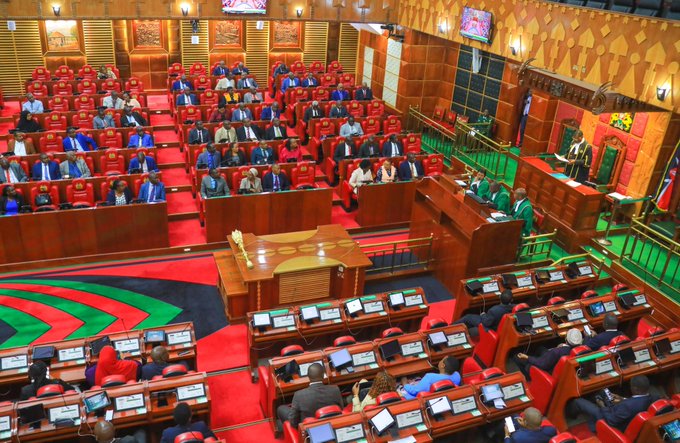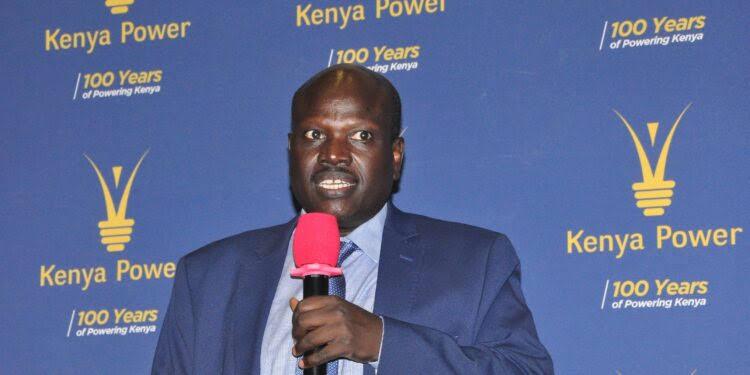
The recent High Court ruling annulling Kenya Kwanza’s majority status in Parliament has triggered uncertainty as the implications of the power shift begin to unfold.
Speaker Moses Wetang’ula is expected to address the House on Wednesday afternoon regarding the ongoing Majority and Minority dispute.
On Tuesday, he faced calls for his resignation over his October 2022 decision, which recognised Kenya Kwanza as having 179 MPs compared to Azimio’s 157.
Last week, a three-judge bench—Justices John Chigiti, Lawrence Mugambi, and Jairus Ngaah—overturned Wetang’ula’s decision but did not explicitly declare which side holds the Majority.
The court ruled that he violated the Constitution by assigning Kenya Kwanza 14 MPs from other parties without justification.
The ruling has thrown Parliament into disarray, as a shift in the Majority could have far-reaching consequences.
Key decisions, including the composition of committees and selection panels, are based on parliamentary numerical strength.
Implications on House Business Committee (HBC)
MPs will miss Wednesday morning’s sitting, usually reserved for Private Members’ Questions, as the House has yet to set its business.
On Tuesday, chaos in Parliament delayed the approval of members set to sit in the HBC, which is chaired by Speaker Wetang’ula.
This
powerful committee determines the House’s calendar and approves all business
before it is tabled.
The HBC includes the Majority and Minority leaders, their respective Whips, and nine other members nominated by parliamentary parties and approved by MPs in a plenary session at the start of each session.
It is the House’s first order of business upon resumption from recess and is usually prioritised to set the agenda and calendar.
The
committee is largely controlled by the government-allied faction, meaning a
shift in Majority status could disrupt the normal functioning of the House.
Implication on oversight committees
The High Court ruling could impact President William Ruto’s legislative agenda and disrupt committee operations.
While the ruling does not affect Ruto’s numerical advantage in the House, it assigns Azimio coalition members the majority in committees.
This could
pose a challenge for the President if he falls out with Azimio MPs, as they
could block his agenda in committee deliberations.
If the ruling is upheld, Kenya Kwanza will be forced to lead the oversight committees, including the Public Accounts and Public Investments Committees.
These committees are legally chaired by the Minority side to ensure government accountability.
Since Kenya Kwanza formed the government but is now considered the Minority—based on the High Court ruling—this creates a legal and procedural dilemma for the House.
Key
government business, including the Budget Policy Statement expected on February
14, could face obstacles if the Majority-Minority leadership is restructured.
Selection Committee of the House
Standing Order 172(1) of the National Assembly establishes the Selection Committee, chaired by the Leader of the Majority.
Aside from the Majority and Minority Leaders, the committee consists of up to 21 members nominated by parliamentary parties and approved by the House.
It is responsible for selecting MPs to serve in various House committees and has the authority to de-whip members.
With an ongoing push to remove MPs aligned with Deputy President Rigathi Gachagua, the court ruling complicates matters.
If Speaker Wetang’ula upholds the ruling, Azimio will control the Selection Committee, making it difficult for Kenya Kwanza to dictate committee appointments.
Losing control of this committee could also weaken Kenya Kwanza’s influence in departmental committees, which are currently dominated by its MPs.
The
numerical advantage granted to the Majority party allows them to elect
chairpersons and vice chairpersons, meaning an Azimio-led Majority would shift
committee leadership away from Kenya Kwanza.
Parliamentary Service Commission (PSC)
If the
ruling stands, the Parliamentary Service Commission (PSC) will need to be
reconstituted to reflect the new Majority-Minority reality.
The PSC, which employs and pays salaries for MPs and parliamentary staff, is composed based on numerical strength in Parliament.
Article 127 of the Constitution establishes the PSC with the Speaker as Chairperson and the Clerk of the Senate as Secretary.
The PSC includes seven members appointed by Parliament: Four nominated equally from both Houses by the Majority party or coalition, including at least two women.
Others are three members from the Minority side, nominated by parties not forming the government.
Two public members (one man and one woman) appointed by Parliament for their experience in public affairs.
South Mugirango MP Sylvanus Osoro dismissed Azimio’s claims to the Majority status, warning that revising House leadership could cast doubt on past parliamentary decisions.
He also questioned the financial implications, including allowances paid to Majority and Minority leaders during their tenure.
“We need to
ask ourselves what will happen to the IEBC selection panel and the money
already paid as allowances in this House,” Osoro said.
IEBC Selection Panel Composition
The Independent Electoral and Boundaries Commission (IEBC) selection panel’s composition is based on the Majority-Minority structure in Parliament.
The IEBC
Act, Cap. 7C, outlines the selection panel as follows:
Two members nominated by the PSC (one from the Majority party and one from the Minority).
Three members from the Political Parties Liaison Committee.
One member from the Law Society of Kenya.
One member
from the Institute of Certified Public Accountants of Kenya.
Two members from the Inter-Religious Council of Kenya.
If the
Majority-Minority status changes, the IEBC selection panel’s composition may
need to be revised, further complicating electoral reforms.











